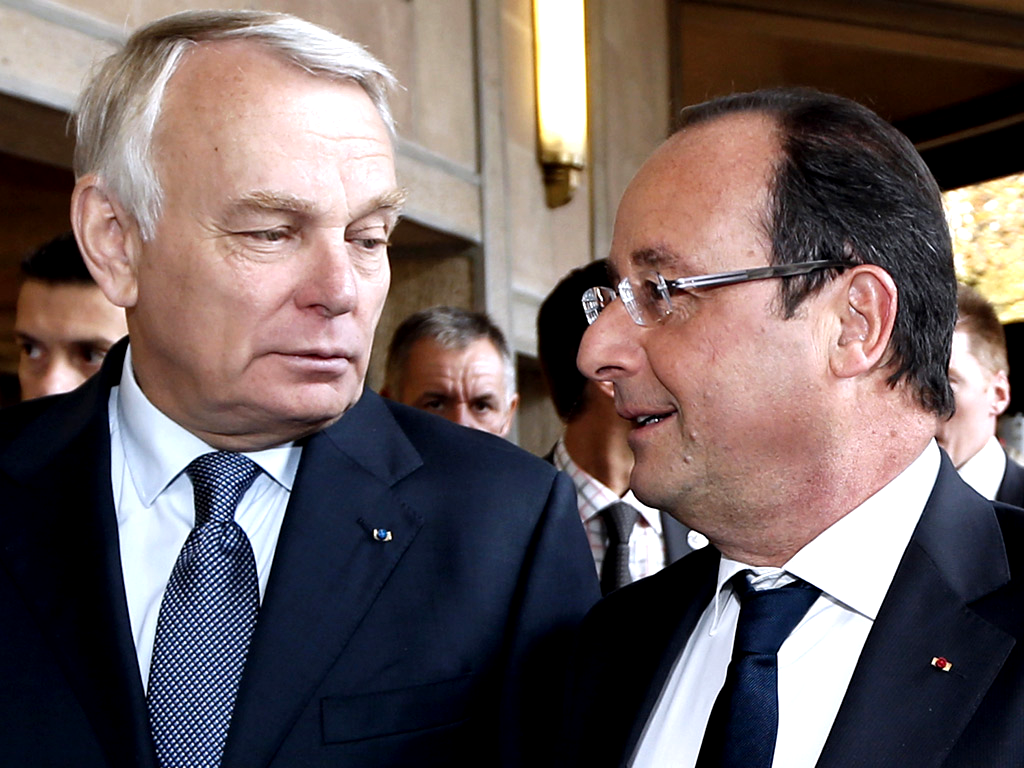François Hollande faces growing pressure to sack PM Marc Ayrault
The French president has been left with little room for manoeuvre by collapsing poll ratings

President François Hollande is under growing pressure to sack his Prime Minister, Jean-Marc Ayrault, to win breathing space for his stumbling administration.
The Elysee Palace insists that no change is imminent but Mr Hollande has been left with little room for manoeuvre by collapsing poll ratings, an anti-tax insurrection and a catalogue of government mis-steps and fumbles.
Mr Hollande hopes to wait for inevitable left-wing reverses in municipal and European elections next spring before he resorts to the blood sacrifice used by struggling presidents in the past. But Socialist parliamentarians fear that Mr Ayrault may have to be ditched more rapidly to restore some direction and credibility to Mr Hollande’s 18- month-old presidency.
One Socialist deputy, Malek Boutih, called in a newspaper interview this week for the Prime Minister to be replaced immediately as a form of “electro-shock” therapy. On the same day, Mr Hollande had lunch at the Elysee Palace with the former Socialist party leader Martine Aubry, who was passed over for the premiership when Mr Ayrault was chosen in May last year.
Since then other Socialist deputies have twice demonstrated their support for Mr Ayrault, 63, by giving him a standing ovation when he entered the national assembly. The calm but rather colourless Mr Ayrault said that he had “taken absolutely no notice” of his colleague Mr Boutih’s de facto vote of no confidence.
All the same, the prime minister’s career hangs by a thread. Mr Ayrault and President Hollande are in danger of losing control of an increasingly depressed and fractious national mood.
An opinion poll this week gave the two men a positive rating of only 21 per cent. A populist, anti-tax protest, which has been compared by political commentators to the rise of the Tea Party in the United States, is spreading from Brittany to other regions. President Hollande was booed and insulted by far-right demonstrators during two ceremonies to mark Armistice Day on Monday.
An avalanche of industrial job losses threatens to bury Mr Hollande’s often repeated promise that he will “turn the tide” of increasing joblessness by the end of the year. Despite official and unofficial forecasts of a gathering economic recovery, the Standard and Poors agency downgraded France’s credit rating to double A at the end of last week.
“Hollande knew the first part of his presidency would be awful. He didn’t think that it would be this bad,” a minister told the newspaper Le Figaro on Wednesday.
A change of prime minister would allow Mr Hollande to say that he had taken account of the protests and now intended to steer France in a new direction. Some Socialist politicians are urging him, instead, to change the national conversation by declaring political war on racism and the far right.
After weeks of racially-loaded insults aimed at the black justice minister, Christine Taubira, the hard right weekly newspaper Minute this week published a front page photograph of the minister below crass headlines referring to bananas and monkeys. The government on Wednesday launched a possible prosecution of the newspaper for “racial abuse”.
Some left-wing politicians and presidential advisers believe that these attacks - and the far right intrusion into the solemnity of Armistice Day – give Mr Hollande an opportunity to fight back. They want the government to galvanise depressed left-wing supporters by calling for nationwide “Republican marches” against racism on 8 December.
Other voices in the government fear that such an appeal would flop, making the government look weak and unloved. “We would need the whole hearted support of our troops,” one adviser said. “But our real problem is not the radicalisation of the Right. It is the collapse of support in our our own social and electoral heartlands.”
Join our commenting forum
Join thought-provoking conversations, follow other Independent readers and see their replies
Comments